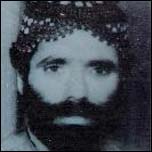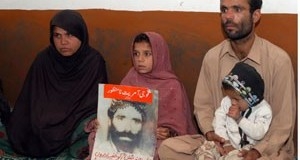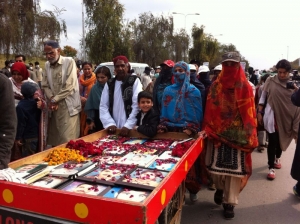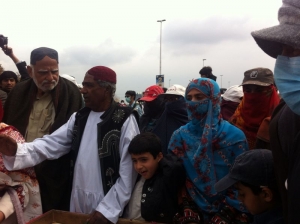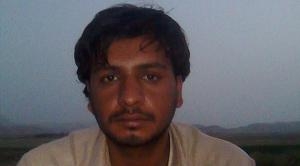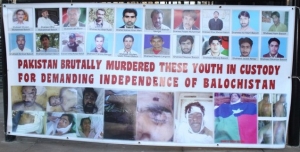The case of the disappearance of a master tailor exposes how the army is involved and the weaknesses of the judicial system
The Asian Human Rights Commission has received the details of the saga of disappearance of a master tailor who was arrested on two occasions by army personnel and how since October 2001 his whereabouts are unknown. The high officials of the Pakistan army including Corps Commander of Balochistan province, a major general, the governor of the province and above all of them, the chief of the Inter Services Intelligence agency (ISI) had confessed on the holy Quran in 2003 that the victim was in the custody of the ISI and that he would be released after the investigation.
The Judicial Commission to probe the cases of missing persons has also submitted a report to the Supreme Court of Pakistan that Mr. Bangulzai, the master tailor, was in the custody of secret services of Pakistan.
The dilemma is that since 2001 to date, the higher courts, the governments of the federation and Balochistan have failed to recover him because of the involvement of the army and its intelligence agencies in his disappearance.
Mr. Ali Asghar Bangulzai 50, the son of Ghulam Nabi was arrested the first time by secret services on June 1, 2000 from his tailoring shop. After 14 days he was released. After his release it was found that he had lost his memory because of the severe torture he had endured. He could not even recognise his own house where he was born. After his recovery he revealed to his family that he was kept in a torture cell at the basement of army’s Kulli camp situated at Quetta cantonment. During his confinement he was kept blindfolded at all times; his hands were cuffed and he was frequently suspended by the wrists by officials of ISI. This is according to his family members from he later told them. After his release for almost one year he was not able to run his tailoring shop.
Mr. Bangulzai was the resident of Chaki Shahwani, Sariab Road, Quetta, capital of Balochistan province. His tailor shop was in walking distance from his home. The army was suspicious that many people were visiting his shop and that he must be involved in militant activities.
Again, on October 18, 2001 Bangulzai was arrested along with his friend Mohammad Iqbal by men who came in army vehicles. Iqbal was released after 22 days he told Bangulzai’s family members that he was in an army torture cell. The family tried to contact the local officials and army command office for his whereabouts but they refused to meet the family. In early 2002, a constitutional petition was filed in the Balochistan high court, during hearing Mr. Iqbal recorded his statement that Bangulzai was in Kulli Army camp. He also took part in a press conference in Quetta Press Club with Bangulzai family members with regard to his arrest .The family members also submitted an application to SHO (Station head officer) Sariab Police Station with a request to lodge an FIR (First information report) about his illegal arrest and disappearance but the police refused to file the FIR because of the involvement of military intelligence agencies. The family of the victim also filed an application before the High Court to order police to file the FIR but the court could not help the family.
On April 27, 2002 family members of Bangulzai met the then Major General Abdul Qadir Baloch , who was Corp Commander of the province to inquire about the whereabouts of the Bagulzai. The family was given assurance that they would be informed about his whereabouts. The Corps Commander sent two officers from military intelligence to the house of victim on May 15, 2002 who told the family that Bangulzai was safe and in the custody of the ISI. As the interrogation is completed he would be released but officials refused to allow the family members to meet him.
In the meantime the family members in desperation tried to meet members of the parliament. They were able to meet Mr. Hafiz Hussain Ahmad MNA (Member of National Assembly) who took the family members to meet with the head of ISI (Inter services intelligence) Baluchistan, Brigadier Siddique. During the meeting Brigadier called Colonel Bangush and asked him to bring the file of Bangulzai. After seeing the file Brigadier Siddique congratulated the family and said that Banguzai was in their custody. During different meetings the family members of Bangulzai insisted that they wanted to meet with him but every time they were told that there was no need as he would be released soon.
On October 4, 2003 Brigadier Siddique asked the family members of the victim to provide clothes for him because all arrangements had been made for his release.
For the whole one year family members waited for his release and then they adopted the peaceful protest. Bangulzai’s children left their studies and went on a token hunger strike camp in front of Quetta Press Club for the safe recovery of their father and to record their peaceful protest. The camp was there for one year.
On July 14, 2005 the Baluchistan High Court on the pressure from lawyers and civil society took suo motto notice and directed the Superintendent of Police (SP) of Chilton Town, Mr. Wazeer khan, to investigate and register an FIR for Bangulzai’s disappearance by the state intelligence agencies. During the hearing seven persons recorded their statements that army personnel had arrested him and that had assured them many times he would be released from army custody. As usual on the pressure from army Sariab Police Station Quetta refused to register the FIR.
On March 2006 Hafiz Hussain Ahmad, the member of national assembly, visited the token hunger strike camp of family members of Bangulzai and told the local news papers representatives that the head of ISI (Inter services intelligence) Brigadier Siddique has himself acknowledge before him that Bangulzai is in their custody and also assured him that he will be released soon. Hafiz deplored the attitude of ISI officers for lying and misguiding the people.
On February 2007 the family members of Bangulzai submitted a petition in Supreme Court of Pakistan, in which Hafiz Hussain Ahmad’s written statement was submitted in the Supreme Court of Pakistan.
In continuation of their efforts the family members filed a petition in the Supreme Court of Pakistan in February 2007 where Mr. Hafiz Hussain Ahmad, the MNA, has submitted his written statement that ISI had assured him several times that Bangulzai is in their custody. The Supreme Court then ordered on January 31, 2010 that the FIR of his disappearance should be filed. The court also directed the police to file the FIRs of other disappeared persons also.
The Joint Investigation Team to probe the cases of disappeared persons, formed by the government of Pakistan, has also submitted a report to the Supreme Court that according to the testimonies of the eye witnesses and other supportive statements Bangulzai was in the custody of state intelligence agencies.
A Judicial commission to probe the cases of the missing persons, formed by the Federal Government on the instruction from Supreme Court has also came to the conclusion in the March 2010 that after recording all the witnesses that Bangulzai was arrested by the Pakistan secret services and that he was in its custody. The report was duly submitted to the Supreme Court of Pakistan.
During the hearing of the Judicial Commission, Mr.Hafiz Hussain Ahmad (MNA) has recorded his statement that the Brigadier Siddique, head of the ISI in Balochistan province, has acknowledge to him that Bangulzai was in their custody and soon he would be released. Mohammad Iqbal who was arrested with Bangulzai also recorded his statement that they were arrested by secret services and that Bangulzai was in their custody. The other witnesses as well recorded their statements that Brigadier has several times accepted in front of them, and Corps commander Qadir Baloch sent his two (MI) (Military intelligence) personnel to the victim’s family and said that he was in the custody of an Intelligence Agency.
It is appalling that 11 years after his arbitrary arrest and incommunicado detention by the intelligence agencies Bangulzai’s whereabouts are still unknown. None of the institutions and officials who were involved in his disappearance has been put on trial despite the fact that they have admitted his detention 11 years ago! Judges hearing disappearances cases have stated in court that any intelligence officer involved in the disappearance of an individual should be placed on trial but this has never happened. Not one has ever been punished.
In the presence of all the evidence that he was illegally arrested and kept incommunicado in an army torture cell by the ISI, the weakness of the country’s justice system is blatantly evident before the powerful military and security agencies. His disappearance by the military is contravention of the basic rights guaranteed by the constitution of Pakistan for example:
Article 4 — The right of individuals to be dealt with by law, Article 10–safe guards as to arrest and detention — the arrested person should be produced within 24 of his arrest before the magistrate, Article 14 — no person should be tortured, Article 15 — freedom of movement and Article 25- all citizens are equal before the law.
The case of Bangulzai is a clear demonstration that the laws of the country do not apply to the military and intelligence agencies. When it comes to providing justice to the ordinary citizen in the face of these institutions the judiciary remains silent.
The Asian Human Rights Commission urges that Mr. Bangulzai should be released immediately from the captivity by the army and its intelligence agencies and that the officials responsible for this arrest and disappearance are prosecuted. Furthermore, the compensation must be paid to his family for the ordeal suffered by him and his family members.

